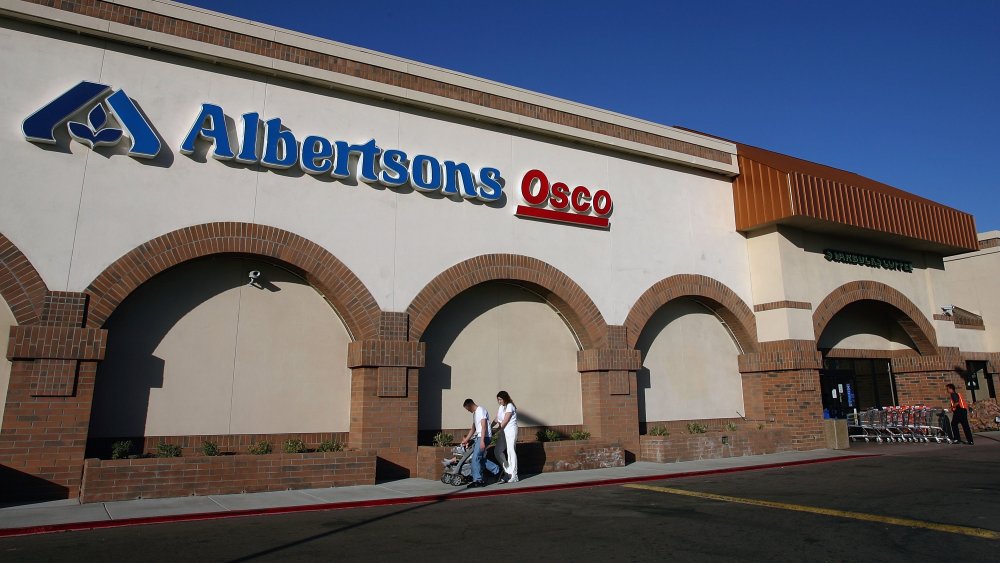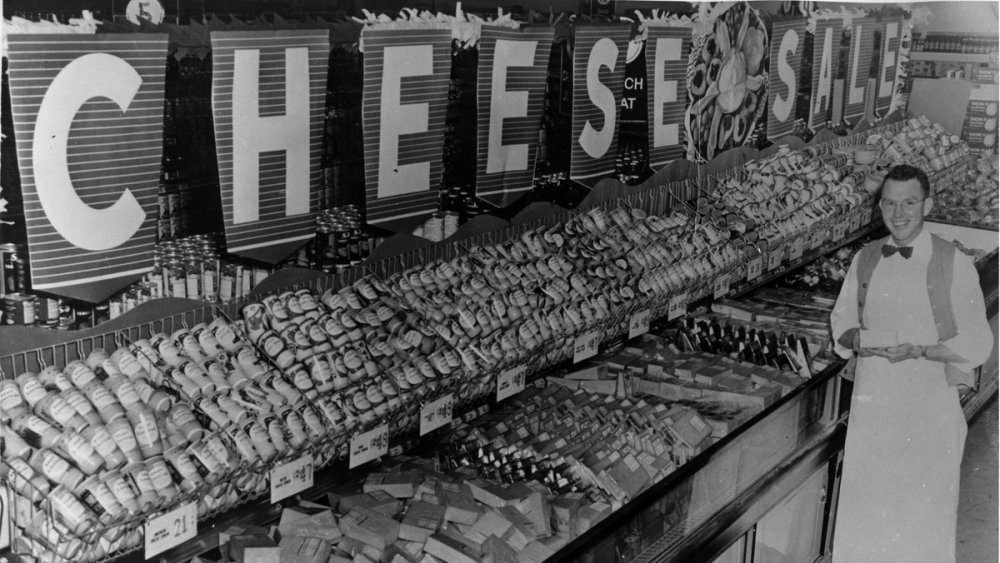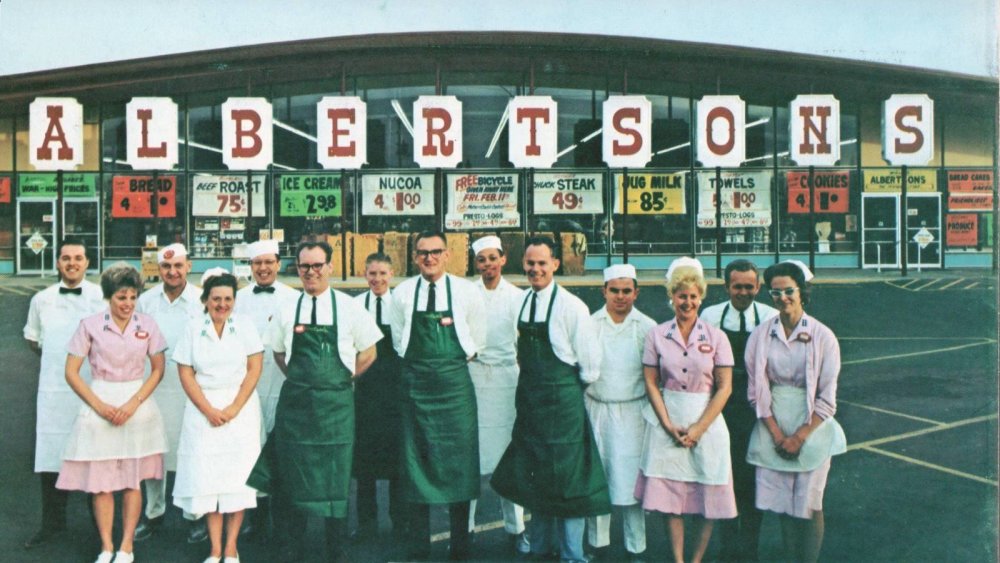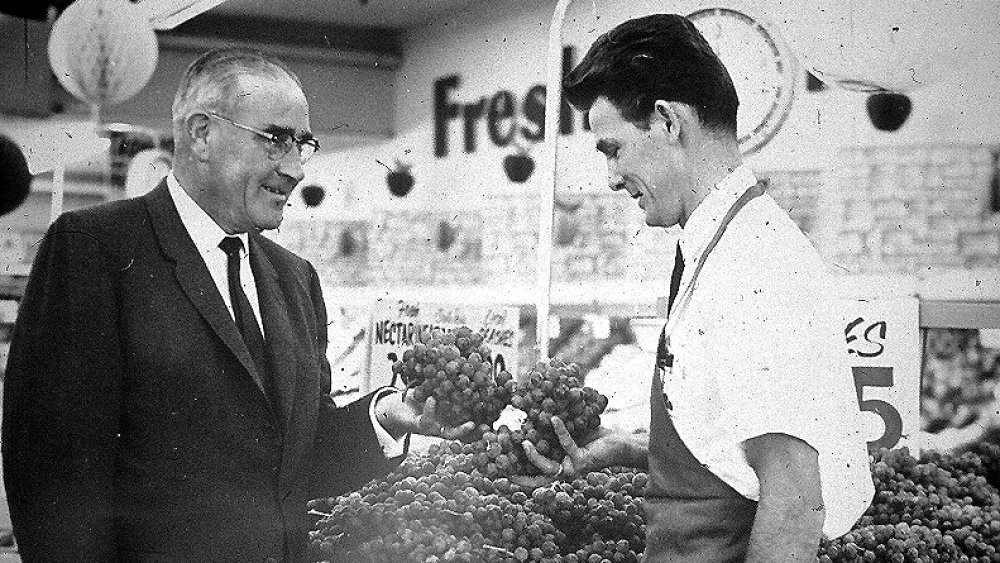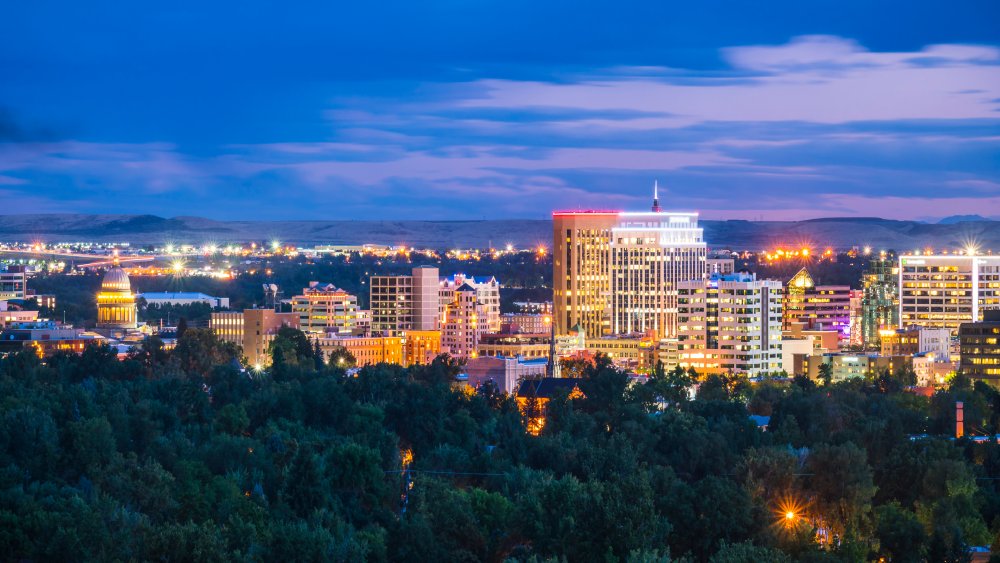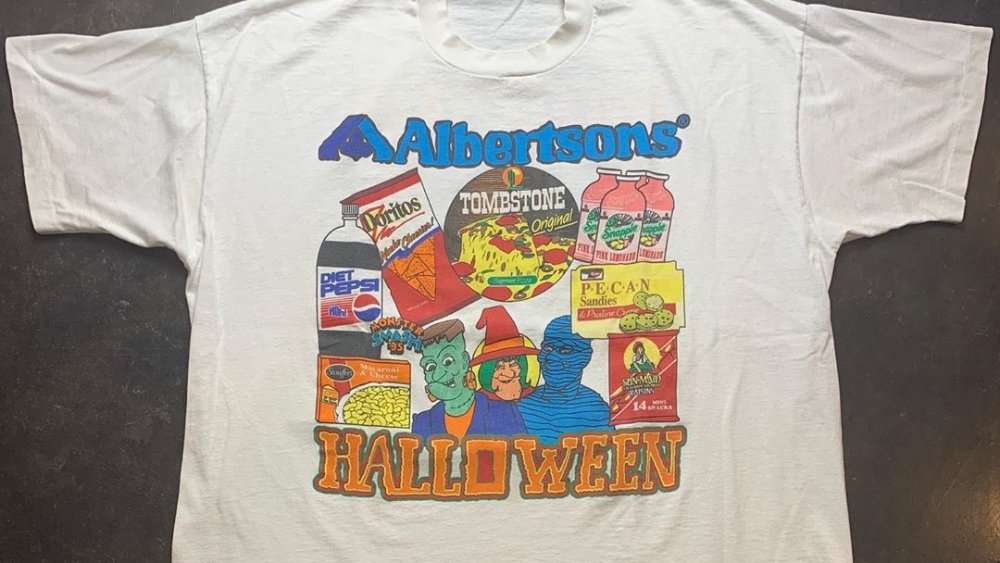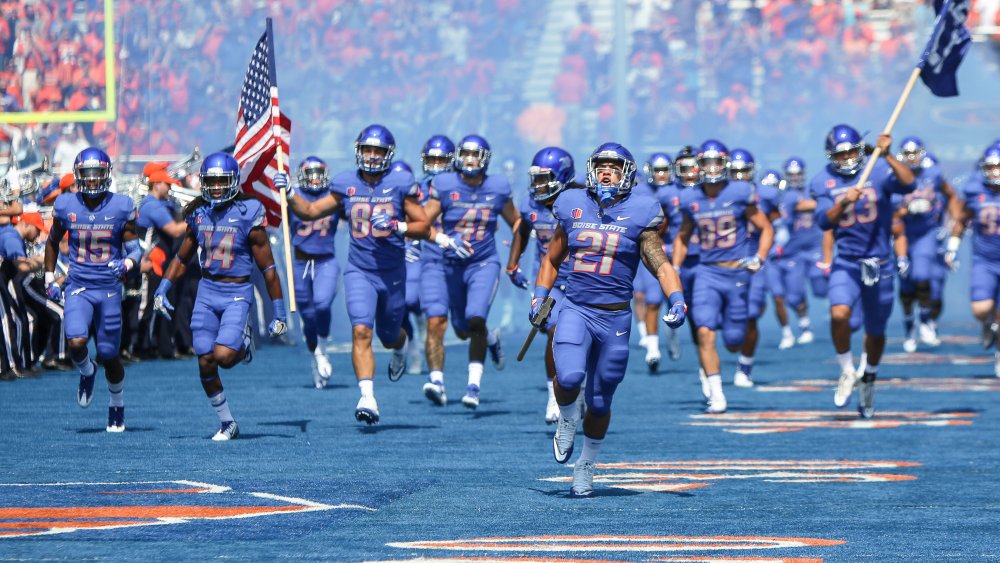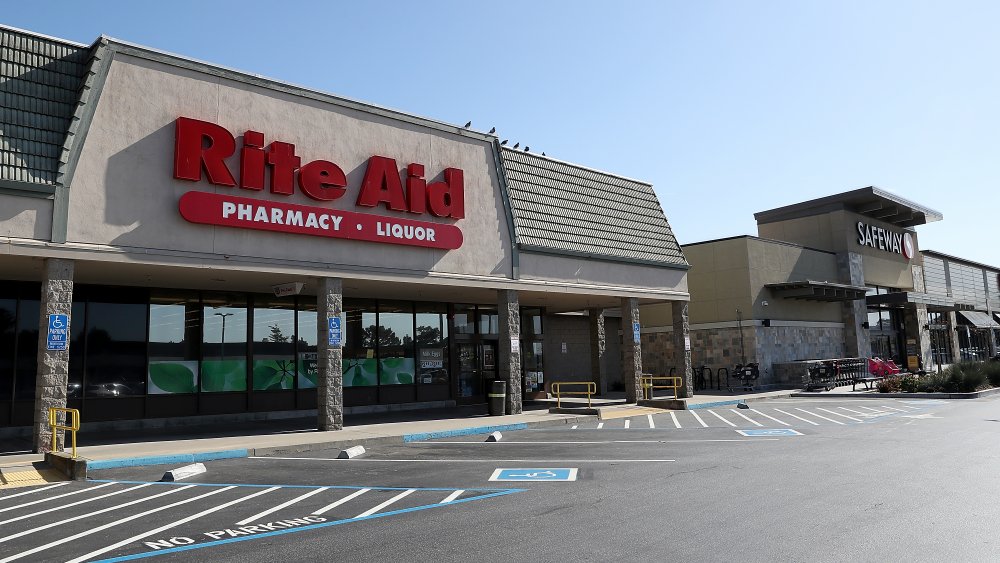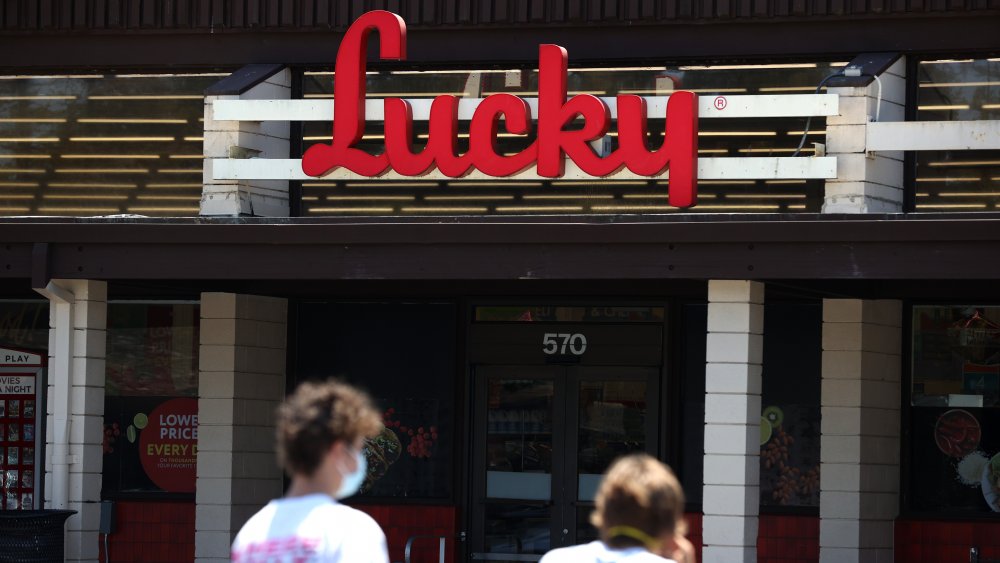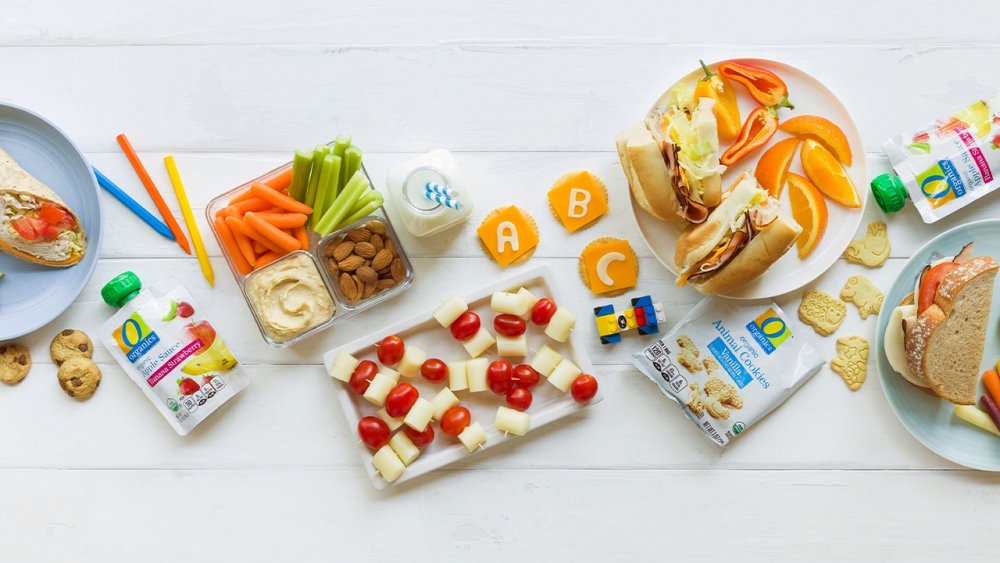The Untold Truth Of Albertsons
Albertsons, a major grocery store chain operating more than 2,250 locations in 35 states and the District of Columbia as well as 20 separate banners, needs no introduction — even though we just gave you one anyway. It just debuted as a public company this summer, and it currently ranks as the second-largest supermarket operator in the country (it comes in right behind Kroger).
But even grocery conglomerates like this one have humble beginnings. One guy started the whole thing with some saved and borrowed money and created a new food shopping experience, along with many firsts, for customers right there in Boise, Idaho.
Today, Albertsons sticks to its innovative roots (and its Idahoan roots) thanks to an advanced online shopping experience, major efforts to address climate change, and some pandemic-related business changes. That's not to say Albertsons hasn't seen its share of drama, including a merger with Rite Aid that was nixed less than 24 hours before the vote. Here's a deep dive into this neighborhood grocery chain's eight-decade history, starting with day one.
Joe Albertson started his business in 1939
Every major supermarket conglomerate has a humble origin story, and Albertsons is no exception. Though its true history dates back to the mid-1800s, Joe Albertson officially started the store on July 21, 1939.
Albertson's experience was as a Safeway district manager, but he was aiming to open his own store. He'd saved $5,000 and borrowed another $7,500 from his aunt-in-law (thank you, Aunt Bertie). He also partnered with L.S. Skaggs, a director in the Safeway arena, and Skagg's accountant, Tom Cuthbert (via NPR). With this foundation, the first Albertsons opened at 16th and State Streets in Boise, Idaho.
There was definitely fanfare. A newspaper ad announcing the opening apparently dubbed it as "Idaho's largest and finest food store." It promised convenient hours, free parking, and a money-back guarantee.
It was a hit. Albertson grew the company's sales to more than $1 million by the end of 1941.
Albertsons offered a number of new grocery store features
That first Albertsons Food Center store in Boise, Idaho, was different in a number of ways from Safeway and other grocery stores customers frequented at the time. Primarily, it was a one-stop shopping market. It was also huge, clocking in at 10,000 square feet. This was about eight times the size of a typical grocery store in the late 1930s (via Groceteria.com)
It featured elements we see often today, including an on-site bakery, which apparently filled the new store with the smell of baking bread. Other treats reportedly included roasted nuts, fresh popcorn, and a fancy automatic donut machine. The company also sold its signature Big Joe's homemade ice cream. You could get a hand-dipped ice cream cone that would only cost a nickel. Plus, you can't forget that the store offered one of the first grocery store magazine racks in the nation.
Joe Albertson was quite the philanthropist
Albertsons founder Joseph Albert Albertson (for real with that middle name) did more with his life than run a successful grocery chain. In fact, his whole life is pretty interesting. Albertson was born in Oklahoma in 1906 but grew up in Caldwell just west of Boise, Idaho. He met his wife in chemistry class, and the two were married on New Year's Eve 1929 by the first president of the College of Idaho. What's more, that college changed its name to the Albertson College of Idaho from 1991 to 2007 (it's since gone back to the College of Idaho).
The reason a small liberal arts school went by Albertson College for 16 years is because Albertson donated about $35 million to the institute up until his death in 1993. These and other donations were made through the J.A. and Kathryn Albertson Foundation, which was established in 1966. By its 50th anniversary in 2016, the organization had given nearly $700 million to Idaho communities. In 2019 alone, it had given $32 million to charitable organizations.
Though described as a private man, Albertson was big on public projects. For instance, he also donated 14 acres of land neighboring the Boise River to the city in 1989, which was then turned into Kathryn Albertson Park (which is now 41 acres).
Albertsons Companies, Inc. has stuck to its Idaho roots
Albertsons has done very well since that initial store opening in Boise, Idaho, in 1939. Albertsons Companies, Inc., as the business is now known, operates as one of the largest food and drug retailers in the nation. The chain offers more than 2,250 stores in 35 states and the District of Columbia, about 400 sites have adjacent gas stations, and it employs about 270,000 people (via Dun & Bradstreet). But what's sweet is how Albertsons has stuck to its Idahoan roots.
For instance, the company is still headquartered in Boise at 250 East Parkcenter Boulevard. At its peak, Albertsons employed somewhere between 5,000 and 6,000 people in the Boise area alone according to the Idaho Department of Labor data (via NPR).
But one of the more interesting of Albertsons' efforts to keep the company true to its Idahoan roots was circling back to the site of that original store. In 2013, the company opened a remodeled store on the site of the first location (via Supermarket News). While Big Joe's and the automatic donut machine are long gone, a few modern amenities are currently available, including a Redbox, Starbucks, and a growler station.
There is definitely lots of Albertsons merch and vintage gear
We love it when corporations, chains, and other random businesses sell random merchandise. Raising Cane's Chicken Fingers has some, so does Taco Bell and Dunkin', and so does Albertsons.
Known as the grocery store with the big blue A, Albertsons has definitely worked on its image over the decades. Plenty of wearables sport the logo, which has an interesting history. First, the company's official name was Albertson's till 2002, then the apostrophe was dropped. The typeface has definitely changed over the years, too. In the beginning, the name "Albertson's Food Center" was presented in a simple font. Reportedly, according to a comment on a font design site, by 1976, the logo was updated to the Introspect typeface, designed by Walter Landor & Associates, that we know today.
A quick Google search will also produce more household gear, including aprons, stickers, matchbooks, coffee mugs, onesies, and more.
eBay is a primo spot for historic Albertsons gear. In addition to straightforward T-shirts with the logo, there are also lapel pins clearly from previous employees and even uniform collared shirts. Toy Albertsons shipping trucks are also a hot item, apparently for the little ones. Vintage metal signs from old Albertsons locations are also available, and you can even get a vintage Albertsons plastic rain bonnet holder.
There is also an Albertsons Stadium and more sports connections
In addition to The College of Idaho changing its name to Albertson College for several years, the Albertsons name has been associated with many other institutions.
For starters, there's Albertsons Stadium at Boise State University (the one with the famous blue turf, called, appropriately, The Blue). This is the home of the Boise State Broncos football team, as well as the Famous Idaho Potato Bowl. The stadium was originally constructed in 1970 and renamed for the Albertsons grocery chain in 2014. That's when the company arranged to pay $12.5 million over a 15-year span for the naming rights of the stadium. According to the Idaho Business Review, Albertsons made the move to solidify the company's place in Boise. The best part of the story is the fact that, at the time, the stadium was a neighbor to Taco Bell Arena on the same campus.
There's also the Albertsons Boise Open, an annual professional golf tournament held at the Hillcrest Country Club in Boise since 1990.
Albertsons aims to be environmentally friendly
It's funny how some grocery stores, even mega conglomerates like Albertsons, have an ethos. And these days, that usually includes sustainability efforts. According to the Albertsons website, the company claims its goal is to grow as a business while simultaneously reducing greenhouse gas emissions, water usage, and other valuable resources.
Albertsons uses LED lighting in its stores, distribution centers, offices, and manufacturing plants — and harnesses solar energy to power some of these sites as well. The solar energy comes from a growing number of locations with solar panels that generate about 20 percent of the power needed to run the store. What's more, there are seriously two one-megawatt Mitsubishi wind turbines powering part of the distribution center in Tracy, California. About 89 percent of the Albertsons truck fleet is EPA SmartWay-certified, meaning some major freight transportation efficiency is going on. There have also been efforts to reduce plastic waste.
Albertsons also partnered with Plenty, a vertical farming company, to supply about 430 stores in California with greens like baby arugula, baby kale, crispy lettuce, and mizuna mix.
Albertsons offers sustainably sourced seafood
In addition to the many efforts Albertsons makes to address climate change, including major efficiency with electricity use, transportation, and waste reduction, the grocery chain also seeks to stock sustainably sourced seafood.
Behind the scenes, Albertsons has partnered with the non-profit organization FishWise to equip its seafood-sourcing teams with the smarts needed to find responsibly sourced seafood products, according to the company's website. Through this partnership, the Top 5 by 2022 Sushi Commitment was developed. The goal is to ensure the "five most popular wild and farm-raised seafood species used for sushi in its stores will be sourced sustainably and responsibly" (via Forbes).
Behind the cart, shoppers can look for seafood items marked with "Responsible Choice." That means the highly respected Monterey Bay Aquarium Seafood Watch program has deemed that item to be a "Best Choice" or a "Good Alternative." These distinctions are designed to help consumers shop for seafood that's been fished or farmed in ways that have less of an environmental impact while promoting a healthy ocean.
According to Albertsons' sustainability highlights from 2019, 100 percent of the store's house brands, Waterfront BISTRO and Open Nature, offers seafood products sourced to meet the stores responsible seafood policy — hitting the original 2022 goal three years ahead of schedule.
Albertsons' near-merger with Rite Aid was pretty dramatic
In early 2018, it was announced that Albertsons was to acquire the major drugstore chain Rite Aid. That meant that inside all Albertsons locations, where you'd normally find Osco and Sav-On-brand pharmacies at the time, you'd see a Rite Aid pharmacy. But by that August, the whole deal was off.
The combined new company would have created 319 health clinics and 4,345 pharmacies. But, according to Forbes, Albertsons Companies Inc. and Rite Aid Corporation broke off the $24 billion merger less than 24 hours before the shareholders were to vote on the deal. Apparently, those shareholders were not in support. Two advisors from a proxy firm had the dirt. They felt the Albertsons' transaction "undervalued Rite Aid's pharmacy benefit management company, EnvisionRx." Plus, it would load up both entities with debt.
Of course, Albertsons didn't agree, but whatever (via The New York Times).
This was one of a few failed mergers between Albertsons and ... someone. The grocery store's private equity owners at the time, Cerberus Capital Management, tried to push Albertsons into an initial public offering (IPO) in 2015 that was also called off (via CNBC). Other attempts to combine Albertsons with Sprouts Farmers Market and Whole Foods were also rebuked.
Albertsons has multiple subsidiaries — a few you may know
Albertsons Companies operates about 20 well-known grocery banners. In addition to its own name, now the apostrophe-free Albertsons, other companies include Jewel-Osco, Shaw's, Acme, Randalls, United Supermarkets, Tom Thumb, Pavilions, Star Market, and Carrs.
An interesting company under the Albertsons Companies is Safeway — a merger that happened in 2015. Yes, it's the very same place where Joe Albertson got his start. The founder began his career as a clerk at a local Safeway store in Idaho in 1930. Albertson was a Safeway supervisor when he started his own store that became the mega-grocery conglomerate it is today.
The company also acquired a meal kit delivery service called Plated that it has since phased out. The Plated brand will now appear in Albertsons stores so loyal customers can get all their favorites without even having to sign up for a subscription (which is probably a good thing because these kinds of companies tend to present a lot of problems).
In addition to these subsidiaries, Albertsons operates a number of products under Own Brands — more than 11,000 to be exact. Those include O Organics, Lucerne Dairy Farms, Value Corner, and the highly sustainable Waterfront Bistro.
Albertsons' online shopping game is no joke
During a pandemic, it may be no big news that a major grocery chain offers online shopping with delivery. But Albertsons didn't need to scramble in spring 2020 to slap something together for customers shifting to safer shopping options. The grocery giant had been quietly upping its online game for years already. In fact, according to BloomReach (more on them later), Albertsons was one of the first grocery stores to start online delivery in the 2000s.
During the dramatic near-merger with Rite-Aid in 2018, Albertsons had fingers in other pies in the background. One of those pies was the online retail space. By 2019, Forbes was reporting how vice-president of eCommerce Marketing & Merchandising at Albertsons Companies Kenji Gjovig was talking about the online space at the 2019 Digital Food and Beverage Conference.
Since last year, Albertsons' has been successfully moving forward with eCommerce thanks to three partnerships. One is BloomReach, a company using AI to create an advanced search experience in food retail for customers (i.e., you and me). Next, Quotient Technology is Albertsons' digital media platform partner, which helps better connect shoppers with consumer packaged goods (CPG) companies. Finally, Albertsons partnered with Glympse, which specializes in location sharing, to provide real-time tracking of eCommerce orders.
You can see it for yourself. Albertsons offers its product online, sure, but there's more interaction in this space than you may realize. For instance, there are recipes, personalized content, and that "Where's my order?" feature.
Albertsons is doing extremely well during the pandemic
Since Albertsons Companies is one of the largest food and drug retailers in the United States, it's hard to remember the company has such humble beginnings. You know, Joe Albertson saved and borrowed some money to start his own grocery store in Boise in 1939?
This means Albertson has gone through some stuff, including a World War, recessions, and other notable crises in this country. Perhaps because of that long experience handling just about everything that comes its way, the company is handling the COVID-19 pandemic pretty well. For starters, Albertsons has been offering at-home COVID-19 test kits with "no appointment, no line, no uncomfortable nasal swab" starting this September and October. Results will be delivered by email or text within 72 hours.
According to Supermarket News, Albertsons has employed extra safety precautions for its customers and many employees, all while pushing for grocery workers to be designated as emergency first responders. In the spring of 2020, Albertsons and its banners teamed up the United Food and Commercial Workers International Union (UFCW), the nation's largest food and retail union, to designate its supermarket associates as temporary "extended first responders" or "emergency personnel." This was a push to help grocery store workers get priority access to testing and to protective equipment during the outbreak.
As a result of all this, Supermarket News has recently selected Albertsons as its Retailer of the Year for 2020.
